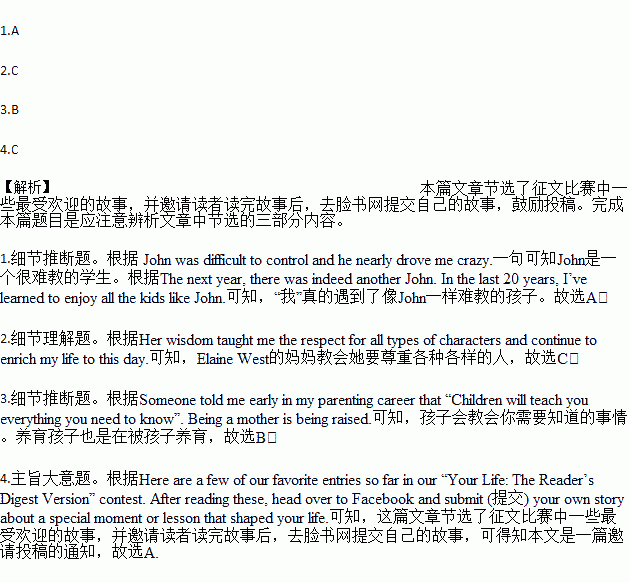题目内容
Here are a few of our favorite entries so far in our “Your Life: The Reader’s Digest Version” contest. After reading these, head over to Facebook and submit (提交) your own story about a special moment or lesson that shaped your life.
“There’s Always a John”
By Darla Boyd
My first year of teaching, there was a kid named John in my class. John was difficult to control and he nearly drove me crazy. While talking about him one day, an old teacher put his hand on my shoulder and said, “There will always be a John. Your job is to lean, to discover what make him different and help him grow better.” The next year, there was indeed another John. In the last 20 years, I’ve learned to enjoy all the kids like John. That advice taught me that there is something to appreciate in everyone.
“An Early Key Lesson”
By Elaine West
Before I began my first teaching job, my mother, a teacher of 30 years, gave me a very special gift, five simple words that have had an effect on my entire life: “Make friends with the janitor (门卫).” Her wisdom taught me the respect for all types of characters and continue to enrich my life to this day. Just five little words but what an impact they can have when you take them to heart.
“Raising Mommy”
By Jan Davis
Being a mother can always present challenges and rewards. Someone told me early in my parenting career that “Children will teach you everything you need to know”. Being a mother is being raised. Our children become our advisers. Their dreams become our professors, as we are taking notes carefully. The sounds of their laughter and smiles on their faces are a great reward to us or bring us great joy. Their tears remind us that it is okay to fail, wipe the tears away and try again.
1.What did the old teacher mean by saying “There will always be a John”?
A. There are always difficult students like John.
B. John will always be an ordinary student.
C. It is important to change John.
D. John is a very common name.
2.What did Elaine West’s mother advise her to do?
A. Don’t treat students differently.
B. Take care of janitors.
C. Respect people from different backgrounds.
D. Don’t judge people by appearance.
3.Which of the following would Jan Davis most probably agree with?
A. A mother should be given more care.
B. A mother improves herself greatly in parenting.
C. Being a mother has more challenges than rewards.
D. Children should realize the dreams of their parents.
4.The text is most probably a(n) .
A. notice inviting contributions. B. introduction to a contest.
C. ad for three new books. D. poster about a lecture.
In the world nothing is more important than health. If people took away our money, houses, cars, or even our clothes, we could still survive. 1. Then how can we keep healthy?First of all, we should eat healthily. I usually avoid eating food high in fat, like French fries or cookies, which are junk food. 2.I only eat little meat. 3. It helps us build a strong body. Regular exercise is an important part of keeping me healthy. In addition, I think friends are an important part of one’s health. 4.I always feel better when I am with friends than when I am alone. When I am with my friends, I always laugh. Laughing is also an important part of health. It is good to stay with my friends.By eating properly and exercising regularly, I can keep my body at a proper weight and keep healthy. By spending time with my friends, I can keep my mind as well as my body happy. These things sound easy to do, but not many people can manage them. 5.
A. What’s more, taking exercise is very important. |
B. Some people appear fat because they often eat too much. |
C. I think a strong will is necessary if we want to keep fit. |
D. I eat a lot of vegetables and fresh fruits which are full of vitamins. |
E. There are some people who like staying alone, but they keep healthy. |
F. But if our health were taken away, we could surely die. |
G. Many studies show that people with few friends often get sick. |

